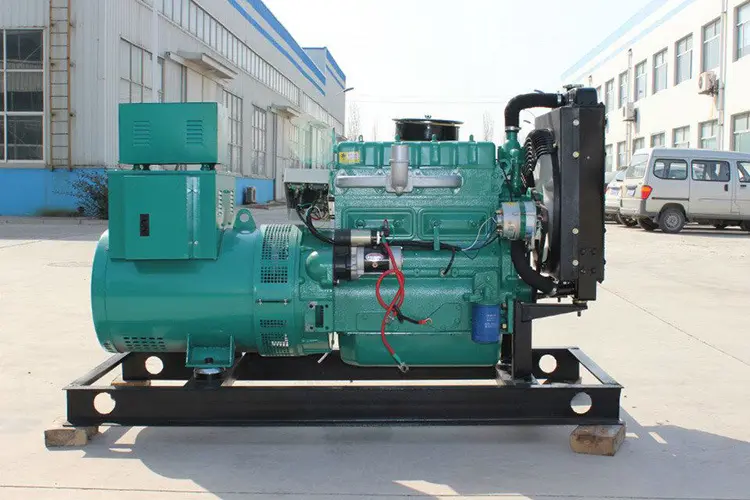Diesel Generator for Islanding Operation Providing Reliable Power in Remote Locations

Introduction:
In the vast expanse of our world, there are remote locations where access to a reliable power grid is a distant dream. These areas, such as isolated islands or remote rural communities, face the challenge of ensuring a continuous supply of electricity for their residents and businesses. In such scenarios, diesel generators play a crucial role in providing power through a process known as islanding operation. This article explores the significance of diesel generators for islanding operation, their working principle, applications, advantages, and considerations for optimal performance.
1. Understanding Islanding Operation:
Islanding operation refers to the ability of a power generation system to operate independently from the main grid in case of a grid outage. In remote locations where connection to a centralized power grid is not feasible, islanding operation allows the local power generation system to continue supplying electricity to critical loads without interruption. Diesel generators are commonly used for islanding operation due to their robustness, reliability, and ability to provide consistent power output.
2. Working Principle of Diesel Generators:
Diesel generators operate on the principle of converting diesel fuel into mechanical energy through combustion, which is then converted into electrical energy using an alternator. The basic components of a diesel generator include the engine, alternator, fuel system, cooling system, exhaust system, and control panel. When the generator is started, the engine burns diesel fuel to drive the alternator, which generates electricity. The control panel monitors various parameters such as voltage, frequency, and load to ensure smooth operation and protect the generator from damage.
3. Applications of Diesel Generators for Islanding Operation:
Diesel generators are widely used for islanding operation in various applications, including:
- Remote Islands: Islands located far from the mainland often rely on diesel generators for their power needs. These generators provide a reliable source of electricity to support the island's infrastructure, including homes, businesses, and essential services.
- Off-Grid Communities: Remote rural communities that are not connected to the main power grid benefit from diesel generators for islanding operation. These generators ensure a continuous power supply for households, schools, healthcare facilities, and other critical services.
- Telecommunication Towers: Telecom towers located in remote areas require a reliable power source to maintain connectivity. Diesel generators are commonly used to provide backup power during grid outages and ensure uninterrupted communication services.
- Mining Sites: Mining operations in remote locations depend on diesel generators for powering heavy machinery, lighting, and other equipment essential for extraction activities. Islanding operation ensures that mining operations continue without interruption.
4. Advantages of Diesel Generators for Islanding Operation:
Diesel generators offer several advantages for islanding operation compared to other power generation technologies, including:
- Reliability: Diesel generators are known for their reliability and durability, making them well-suited for providing continuous power in remote locations with limited access to maintenance services.
- Fuel Efficiency: Diesel engines are more fuel-efficient compared to gasoline engines, resulting in lower operating costs over the long term. This is particularly beneficial for applications with high power demand and limited fuel availability.
- Quick Start-Up: Diesel generators have a quick start-up time, allowing them to provide power within seconds of a grid outage. This rapid response time is critical for maintaining essential services and preventing disruptions.
- Scalability: Diesel generators are available in a wide range of sizes and capacities, making them suitable for various applications with different power requirements. They can be easily scaled up or down to meet changing power demands.
- Longevity: Diesel generators have a longer lifespan compared to other power generation technologies, with proper maintenance and servicing. This longevity ensures a reliable power source for many years, making them a cost-effective investment.
5. Considerations for Optimal Performance:
To ensure optimal performance of diesel generators for islanding operation, several key considerations should be taken into account:
- Proper Sizing: Selecting the right size of diesel generator is crucial to meet the power requirements of the loads it will be supporting. Oversized or undersized generators can lead to inefficiencies, increased fuel consumption, and potential equipment damage.
- Regular Maintenance: Routine maintenance and servicing of diesel generators are essential to keep them in optimal working condition. This includes regular oil changes, filter replacements, fuel system checks, and overall inspection of components.

- Fuel Quality: The quality of fuel used in diesel generators directly impacts their performance and longevity. It is important to use clean, high-quality diesel fuel and store it properly to prevent contamination and degradation.
- Monitoring and Control: Implementing a comprehensive monitoring and control system for diesel generators is essential for ensuring safe and efficient operation. This includes monitoring parameters such as voltage, frequency, temperature, and load to prevent overloading and protect the generator from damage.
- Backup Systems: In addition to diesel generators, it is advisable to have backup systems in place, such as battery banks or renewable energy sources, to provide an additional layer of redundancy during extended grid outages.
Conclusion:
Diesel generators play a vital role in providing reliable power through islanding operation in remote locations where access to a centralized power grid is limited. Comparing inverter vs conventional 400kW generators , reliability, and ability to operate independently make them well-suited for applications ranging from remote islands to off-grid communities and critical infrastructure facilities. By understanding the working principle, applications, advantages, and considerations for optimal performance of diesel generators, stakeholders can ensure a continuous and stable power supply in even the most challenging environments.
